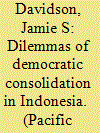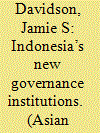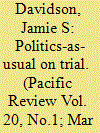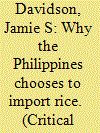|
|
|
Sort Order |
|
|
|
Items / Page
|
|
|
|
|
|
|
| Srl | Item |
| 1 |
ID:
089923


|
|
|
|
|
| Publication |
2009.
|
| Summary/Abstract |
This article grapples with the tricky issue of democratic consolidation in post-Soeharto Indonesia. It recognizes the great strides the country has made toward establishing a rights-based democracy. This includes attempts to tackle the legacies of decades-long authoritarianism - for instance, those times when state elites have put self-interestedness aside to cooperate in the establishment of new institutions that promote genuine democratization. This article argues, however, that democratic consolidation in Indonesia will continue to be bedeviled due to the poor institutionalization of a democratic rule of law. Until state elites and government officials predictably can be relied upon to enforce democratic institutions, and are subject to the law themselves, then a meaningful deepening of Indonesia's elitist/electoral democracy will be unobtainable.
|
|
|
|
|
|
|
|
|
|
|
|
|
|
|
|
| 2 |
ID:
146901


|
|
|
|
|
| Summary/Abstract |
This article argues that the primary obstacle to the independence of Indonesia’s new reform-oriented governance institutions is the extent to which foreign interests have a stake in their formal decisions. They appear to regulate or adjudicate according to rules, in Indonesian-on-Indonesian disputes. When a foreigner-versus-Indonesian pairing is at hand, domestic vested interests tend to prevail.
|
|
|
|
|
|
|
|
|
|
|
|
|
|
|
|
| 3 |
ID:
076782


|
|
|
|
|
| Publication |
2007.
|
| Summary/Abstract |
This article explores to what extent to local pro-reform actors matter in Indonesia through the prism of anti-corruption campaigns in the country's regions. I argue that the rash of anti-corruption campaigns and related trials involving legislative members, especially from mid-2004 onward, can be attributed neither to the resources lavished on anti-corruption organizations based in Jakarta, nor to the popularity of President Yudhoyono's anti-corruption rhetoric. Instead, it can be traced to a particular anti-corruption campaign that began in earnest in 2002 in Padang, West Sumatra. Using a multi-dimensional approach, a small group of activists relentlessly pursued their newly elected provincial legislators to be accountable to their democratic mandates and as important, to respect the rule of law pursuant to new national anti-corruption legislation. The guilty verdicts of May 2004 galvanized similar groups across the country to investigate their respective legislative bodies. This exemplary case of societal accountability also demonstrated the leverage activists can gain over local politicians when they forge coalitions with other elite actors, especially those in Jakarta. I further explore two anti-corruption cases in the province of West Kalimantan to place post-Padang developments in their proper perspective. If hopes were raised that regional anti-corruption movements-based on the Padang model-might accomplish more than sensational trials but help consolidate democracy at the regional level by holding elected officials accountable, these two examples show how fleeting these expectations might be. The trials that took place but which produced no convictions resulted from the fallout of local political tussles, and not from local civil society organizations galvanized by the ideals of transparency and good governance.
|
|
|
|
|
|
|
|
|
|
|
|
|
|
|
|
| 4 |
ID:
157738


|
|
|
|
|
| Summary/Abstract |
Since the 2008 rice crisis, Malaysia's rice policies have been caught between government efforts to raise production and its support of the country's monopoly rice importer (Bernas). This article argues that when the politics behind the country's policies are revealed, the paradox is more apparent than real. The three principal policy components — gratifying Barisan Nasional's coalition partners in East Malaysia by expanding the acreage devoted to rice; buttressing the rural Malay economy by providing subsidies through a yield-enhancing programme; and relying on big business for financial support (Bernas's new owner is one of Malaysia's richest businessmen) — aim to serve the same end: to perpetuate UMNO's political power amid increasing electoral competition.
|
|
|
|
|
|
|
|
|
|
|
|
|
|
|
|
| 5 |
ID:
089378


|
|
|
|
|
| Publication |
2009.
|
| Summary/Abstract |
The horrific violence that has marred Indonesia's 'transition to democracy' raises numerous disconcerting questions; not least of which is how future interested actors or governments - central and regional alike - will tackle these atrocities in a historical framework. How should a series of historical events, such as the killing of thousands of Indonesians by Indonesians be (un)officially remembered? Two paintings that hang in Sambas, West Kalimantan's most prominent cultural centrepiece, the Alwadzi Koebillah kraton, are remarkable, for they give us a glimpse as to how local voices might attempt to possess the historical meanings and readings of Indonesia's recent ethnic strife. Perhaps one of a kind in Indonesia, these paintings boldly portray the bloody battles that took place in Sambas in early 1999, pitting the 'courageous' and 'youthful' Malays of Sambas against the 'middle-aged' and 'treacherous' Madurese. These depictions make it abundantly clear that, through this bloodletting, Sambas Malays awoke from their slumber in time to mobilise, to confront and to defeat their nemesis. As an ethnopolitical force, the glorious rise of 'Malay' is unmistakable. The broader political context in which these paintings were commissioned, however, invests them with greater significance. Only in a decentralised state, one distinct from the excessive centralism of the New Order, would the (semi) public display of these heroic memorials to local, i.e. non-national, violence be made possible.
|
|
|
|
|
|
|
|
|
|
|
|
|
|
|
|
| 6 |
ID:
143666


|
|
|
|
|
| Summary/Abstract |
Embedded in the debate in the Philippines over food security and food sovereignty are three conventional reasons why the country is a longstanding rice importer: geography, exploitative international policy pressure predicated on the dictates of neoliberalism, and colonial history. This paper argues that these conventional reasons share two limitations. First, they attribute mono-causal reasons for perennial rice imports, either in the form of geography, exogenous power, or history. While these perspectives are not wrong, each on its own is inadequate. Multiple, contributing factors have and will continue to abound. Second, each of these arguments limits Filipinos' agency. Through a four-part argument, I show how Filipinos have had more say in the reasons for serial rice imports than these conventional accounts allow.
|
|
|
|
|
|
|
|
|
|
|
|
|
|
|
|
|
|
|
|
|